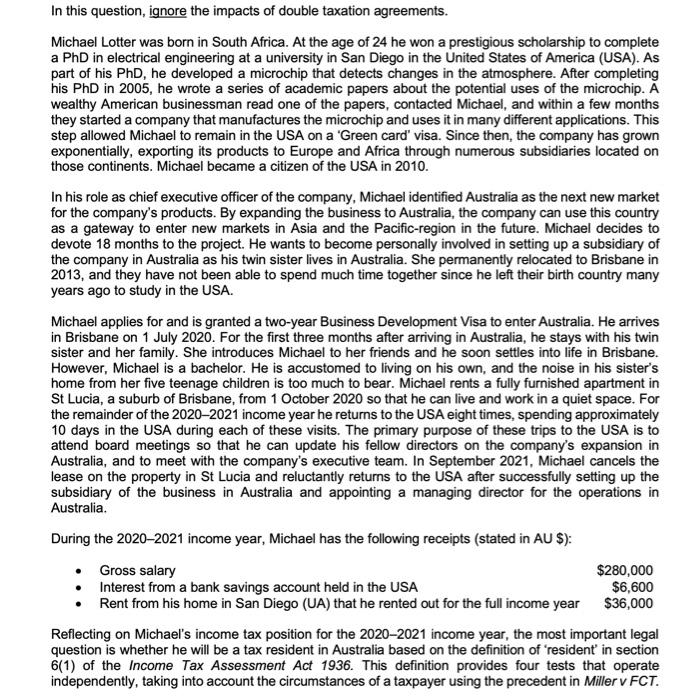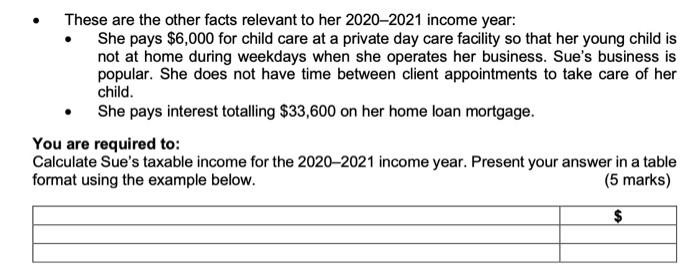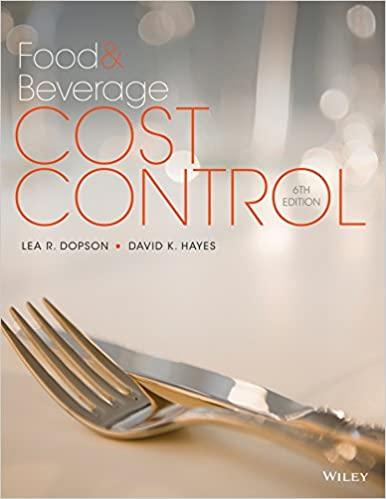In this question, ignore the impacts of double taxation agreements. Michael Lotter was born in South Africa. At the age of 24 he won a prestigious scholarship to complete a PhD in electrical engineering at a university in San Diego in the United States of America (USA). As part of his PhD, he developed a microchip that detects changes in the atmosphere. After completing his PhD in 2005, he wrote a series of academic papers about the potential uses of the microchip. A wealthy American businessman read one of the papers, contacted Michael, and within a few months they started a company that manufactures the microchip and uses it in many different applications. This step allowed Michael to remain in the USA on a 'Green card' visa. Since then, the company has grown exponentially, exporting its products to Europe and Africa through numerous subsidiaries located on those continents. Michael became a citizen of the USA in 2010. In his role as chief executive officer of the company, Michael identified Australia as the next new market for the company's products. By expanding the business to Australia, the company can use this country as a gateway to enter new markets in Asia and the Pacific-region in the future. Michael decides to devote 18 months to the project. He wants to become personally involved in setting up a subsidiary of the company in Australia as his twin sister lives in Australia. She permanently relocated to Brisbane in 2013, and they have not been able to spend much time together since he left their birth country many years ago to study in the USA. Michael applies for and is granted a two-year Business Development Visa to enter Australia. He arrives in Brisbane on 1 July 2020. For the first three months after arriving in Australia, he stays with his twin sister and her family. She introduces Michael to her friends and he soon settles into life in Brisbane. However, Michael is a bachelor. He is accustomed to living on his own, and the noise in his sister's home from her five teenage children is too much to bear. Michael rents a fully furnished apartment in St Lucia, a suburb of Brisbane, from 1 October 2020 so that he can live and work in a quiet space. For the remainder of the 2020-2021 income year he returns to the USA eight times, spending approximately 10 days in the USA during each of these visits. The primary purpose of these trips to the USA is to attend board meetings so that he can update his fellow directors on the company's expansion in Australia, and to meet with the company's executive team. In September 2021, Michael cancels the lease on the property in St Lucia and reluctantly returns to the USA after successfully setting up the subsidiary of the business in Australia and appointing a managing director for the operations in Australia. During the 2020-2021 income year, Michael has the following receipts (stated in AU $): Gross salary $280,000 Interest from a bank savings account held in the USA $6,600 Rent from his home in San Diego (UA) that he rented out for the full income year $36,000 Reflecting on Michael's income tax position for the 2020-2021 income year, the most important legal question is whether he will be a tax resident in Australia based on the definition of resident in section 6(1) of the Income Tax Assessment Act 1936. This definition provides four tests that operate independently, taking into account the circumstances of a taxpayer using the precedent in Miller v FCT. a. Select the one test from the definition of resident' that is most appropriate to determine if Michael is an Australian resident individual for the 2020-2021 income year. Write down the name of this test and provide a brief reason for your answer. (1 mark) b. Apply the test that you have identified in part a of this question to Michael's circumstances to determine if he is an Australian resident individual for the 2020-2021 income year. (6 marks) C. Calculate Michael's taxable income for the 2020-2021 income year. Show all your calculations and provide reasons for your answer. Your answer should reference relevant sections and divisions of the Income Tax Assessment Acts and relevant case law. (3 marks) These are the other facts relevant to her 2020-2021 income year: She pays $6,000 for child care at a private day care facility so that her young child is not at home during weekdays when she operates her business. Sue's business is popular. She does not have time between client appointments to take care of her child. She pays interest totalling $33,600 on her home loan mortgage. You are required to: Calculate Sue's taxable income for the 2020-2021 income year. Present your answer in a table format using the example below. (5 marks) $









